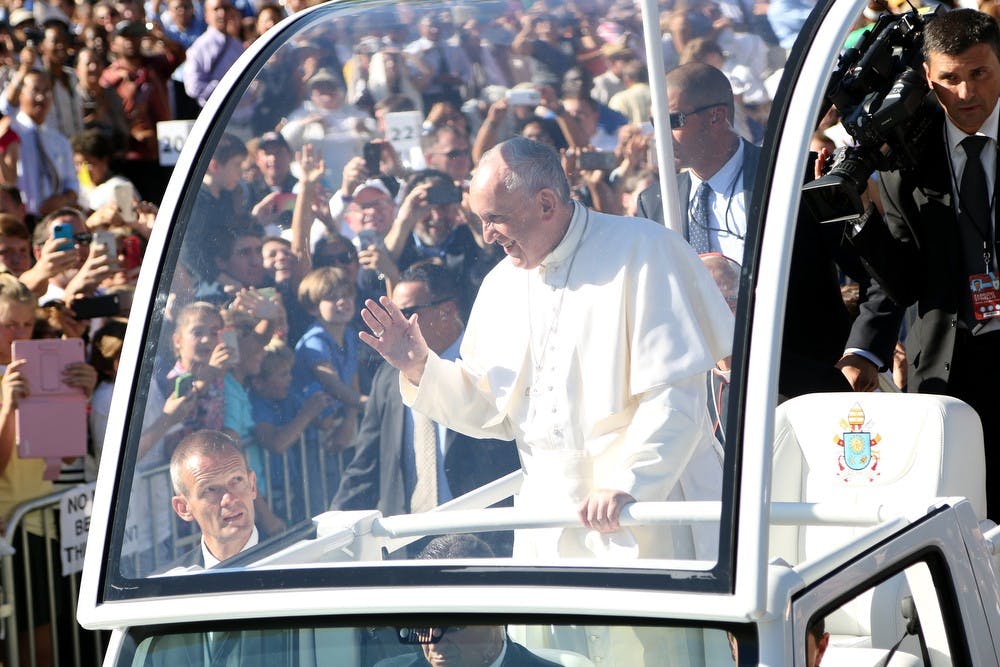In his address to a joint session of Congress on Thursday, Pope Francis called for America to help craft a better future for men and women around the world. Recognizing our nation’s unique position of influence, Francis urged Congressional leaders to enact policies that uphold human dignity and protect the vulnerable from forces beyond their control.
Although many media outlets have been preoccupied with the pomp and circumstance surrounding the pontiff, the Holy See’s visit is a seminal moment for the U.S. in the early years of this burgeoning century. Francis has exposed the distinct lack of compassion and charity in American politics today, and has called on our nation to do better.
Read More: Throwback John Paul II, only pope visit AZ, held Mass at Sun Devil Stadium
When he walked on the tarmac of Joint Base Andrews Tuesday, Pope Francis not only stepped onto American soil; the pontiff stepped directly into American politics.
The pope’s vocal positions on issues ranging from climate change to human rights have inspired widespread debate among American politicians on both sides of the isle. Congressional Democrats and Republicans have touted their agreement with Francis when politically convenient, and denounced his views when they contradict with the politics of their party.
But cherry picking the views of the pontiff shows a fundamental disregard for his basic message: to treat others with compassion and empathy.
I uploaded a new track, "Pope's Speech Before Congress", on #spreaker #congress #pope #popefrancis #popeindc https://t.co/Ya4Ekf6aMp
— Leslie Marshall (@LeslieMarshall) September 25, 2015
Under Francis, Catholicism is on the precipice of entering a new, progressive era. His compassion has already inspired radical shifts in church thinking, such as the easing of the annulment process. Francis is not reinventing Catholicism; on the contrary, he is emphasizing the love and charity at the core of the Catholic faith.
As a humanitarian, Francis has called for governments across the world to enact criminal justice reform as well as combat climate change and economic inequality.
Unfortunately, the America we live in today has failed to uphold his humanitarian ideals.
The U.S. imprisons more of its own citizens per capita than any other nation in the world through punitive sentencing laws. It is one of the only nations in the Western Hemisphere that still maintains the death penalty, even when the deterrent effect of execution is uncertain. It is one of the wealthiest nations in the world, yet childhood hunger, homelessness and poverty are of serious concerns.
Moreover, the U.S. has utterly failed to enact immigration and border policies that recognize the dignity of the many millions who come to our nation seeking a better life. Republican leaders such as former Florida Gov. Jed Bush and former Ohio Gov. John Kasich, torchbearers of compassionate conservatism, have stated that many undocumented immigrants come to our nation out of love, but their pleas for charity have fallen on deaf ears.
Perhaps most importantly to Francis, the U.S. has failed to act on climate change.
Although the U.S. is not solely responsible for rising sea levels or global warming, it is in a unique position to lead the international community in aggressively addressing this global concern. Yet some Congressional leaders are still unwilling to even accept the validity of global warming, let alone act on the issue. To Francis, it is reprehensible that leaders with the ability to combat climate change do so little to stop it.
Francis touched on all of these preventable, moral tragedies in his address to Congress today. But Francis was not simply addressing Congressional Republicans today in the Capital.
While some characterize the pope’s views as left leaning, it is important to remember that leaders of the Democratic Party have also failed to uphold Francis’s humanitarian standards in recent months.
Over the last year, the Obama administration has aggressively campaigned for the passage of the Transpacific Trade Partnership, despite serious concerns over human rights abuses in numerous Southeast Asian nations.
Similarly, the Obama administration’s easing of relations with Cuba has drawn concern from human rights activists. Republican presidential candidate Marco Rubio and others rightfully maintain doubts over President Obama’s decision; the Caribbean nation has a dubious human rights record and little incentive to change with increased diplomatic ties. Pope Francis even felt compelled to address the topic in his visit to Cuba, emphasizing the importance of human rights in his speech in Havana.
Francis’s visit to the U.S. is so significant because he is forcing us to recognize our nation’s own shortcomings. But Francis has come to America with a message of hope, not despondence. In a democratic society, we the people of this nation have the power to directly shape the future of our country. Let us take his compassionate message to heart, and demand federal policy that recognizes the human dignity all people deserve.
Related Links:
What will the new pope bring to the table?
Pope Francis promotes dual-natured economic philosophy
Reach the columnist at clmurph5@asu.edu or follow @ConnorLMurphy on Twitter.
Editor’s note: The opinions presented in this column are the author’s and do not imply any endorsement from The State Press or its editors.
Want to join the conversation? Send an email to opiniondesk.statepress@gmail.com. Keep letters under 300 words and be sure to include your university affiliation. Anonymity will not be granted.
Like The State Press on Facebook and follow @statepress on Twitter.




